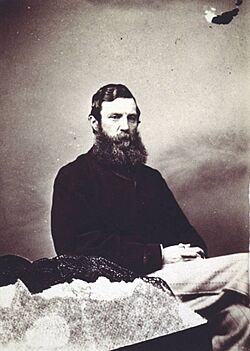Richard Dry facts for kids
Quick facts for kids
Sir Richard Dry
KCMG
|
|
|---|---|
 |
|
| 7th Premier of Tasmania | |
| In office 24 November 1866 – 1 August 1869 |
|
| Preceded by | James Whyte |
| Succeeded by | James Milne Wilson |
| Personal details | |
| Born | 20 September 1815 Launceston, Van Diemen's Land |
| Died | 1 August 1869 (aged 53) Hobart, Tasmania |
| Spouse | Clara Meredith |
Sir Richard Dry (born September 20, 1815 – died August 1, 1869) was an important Australian politician. He was the Premier of Tasmania from 1866 until he passed away in 1869.
Richard Dry was the first Premier of Tasmania who was born in Tasmania. He was also the first person from Tasmania to be made a knight, which is a special honour.
Contents
Early Life and Education
Richard Dry was born in Launceston, which was then called Van Diemen's Land. Today, this area is known as Tasmania. His father, also named Richard Dry, was a farmer and officer. His mother was Anne Maughan.
Young Richard went to a private school in Campbell Town. He was good friends with a diarist named Anna Baxter.
In 1835, Dry traveled to Mauritius and parts of India. When he returned to Tasmania, he started managing his father's large farm. This farm was called Quamby Estate and was about 30,000 acres. He inherited the estate when his father died in 1843.
Starting in Politics
In 1837, Richard Dry became a Magistrate, which is like a local judge. In 1844, the Lieutenant-Governor, Sir John Eardley-Wilmot, chose Dry to be a member of the Tasmanian Legislative Council. This council helped govern the colony.
Dry and five other members, known as the "patriotic six," resigned from the council. They disagreed with Governor Wilmot about how the convict system was affecting the colony. They felt it was too expensive and made it hard for free workers to find jobs.
In 1848, these six members were asked to rejoin the council. When the council was reformed in 1851, Dry became a leading member of the Anti-transportation League. This group wanted to stop sending convicts to Tasmania. He was elected to represent Launceston.
Becoming Speaker and Premier
In 1851, Dry was chosen by everyone to be the Speaker of the Legislative Council. He held this important role for four years. In 1855, he resigned and traveled to Europe for health reasons.
Dry came back to Tasmania in 1860. In 1862, he was elected to the Legislative Council again. On November 24, 1866, he became the Premier of Tasmania and colonial secretary.
During his time as Premier, his home at Quamby Estate was sometimes called the "Government House of the North." Dry was very interested in bringing railways to Tasmania. He was involved with railway groups in Launceston and Deloraine.
His government worked to save money and introduced new laws. One important law was the Torrens real property act, which made it easier to buy and sell land. They also encouraged the sale of Crown lands, which were lands owned by the government.
In 1869, Dry's government set up telegraph communication with Victoria. They did this by laying a special cable under Bass Strait. This was a big step for communication in the region.
Personal Life and Legacy
Sir Richard Dry passed away in Hobart, Tasmania on August 1, 1869, after a short illness. In 1853, he had married Clara Meredith, the daughter of George Meredith. They did not have any children.
He was buried at St Mary's Anglican church in Hagley. He had helped build and support this church. The church's tower is dedicated to his wife. Richard Dry was knighted in 1858, which was a great honour for a Tasmanian-born person.
Dry was the first person born in Tasmania to become a member of its parliament. He was very popular, even when he was young, because he fought for political freedom. He remained popular throughout his life.
He wished to be buried at Hagley church near Quamby, the church he had helped build. When he died, all businesses in Hobart closed for his funeral. People from every town joined the procession as his body was taken to the church.
People remembered him for his kindness and generosity. He was known for being humble and treating everyone with respect. His good character earned him the affection of the entire colony. A special part of Hagley church was added as a memorial to him, paid for by public donations. A scholarship, called the "Dry Scholarship," was also created in his honour.
 | Dorothy Vaughan |
 | Charles Henry Turner |
 | Hildrus Poindexter |
 | Henry Cecil McBay |

